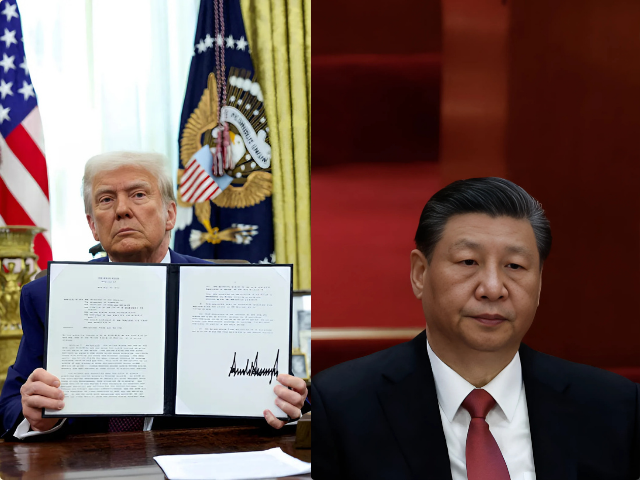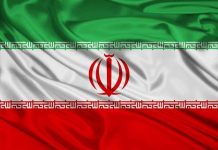——— Signs executive order raising China import tariffs to 245% amid ongoing trade tensions
——— Xi makes a case for free trade, presenting China as a source of ‘stability and certainty’
DM Monitoring
WASHINGTON: US President Donald Trump on Tuesday signed an executive order increasing tariffs on Chinese im-ports to 245%, citing China’s retaliatory measures as the trigger for the move.
The order, issued on April 15, marks a significant escalation in the ongoing US-China trade dispute. Ac-cording to a White House factsheet accompanying the announcement, the tariff hike follows what the administration referred to as “Liberation Day” — the date when initial tariffs were imposed.
Since that time, over 75 countries have reportedly approached the United States to negotiate new trade agreements. The document states that China, unlike other countries, responded with retaliatory tariffs, prompting the administration to take what it described as “decisive economic action.”
The White House maintains that the heightened levies serve both economic and national security ob-jectives. “China’s retaliatory actions left us no choice,” the factsheet said, framing the order as a nec-essary response to unfair trade practices.
Economists, however, have consistently warned that sweeping tariff increases may lead to higher con-sumer prices and strained global supply chains. Critics argue that the move could further isolate the US from international trade partners and increase economic volatility.
There was no immediate response from Beijing at the time of publication. Analysts say China may seek to challenge the measure through the World Trade Organization or implement countermeasures of its own.
The executive order takes effect immediately and applies to a broad range of Chinese goods entering the United States. Further details on affected sectors and product categories are expected to be re-leased by the Office of the United States Trade Representative later this week.
Earlier, China’s Xi is making the case for free trade as he tours Southeast Asia this week, presenting China as a source of “stability and certainty.”
On Monday, he was welcomed to Hanoi with pomp and ceremony by Vietnam’s President Luong Cuong.
He arrived in Kuala Lumpur, Malaysia’s capital, later Tuesday, for a three-day visit and will end his tour with a stop in Cambodia.
In Hanoi, Xi had a meeting with Vietnam’s Communist Party General Secretary To Lam, where he said the two countries “have brought the world valuable stability and certainty” in a “turbulent world.” He also paid respects at the mausoleum of Ho Chi Minh, the founder of the Vietnamese Communist Par-ty.
“As beneficiaries of economic globalization, both China and Vietnam should strengthen strategic re-solve, jointly oppose unilateral bullying acts, uphold the global free trade system, and keep global in-dustrial and supply chains stable,” he added, according to a statement from China’s Ministry of Foreign Affairs.
Chinese President Xi Jinping, center, walks with Vietnam’s Communist Party General Secretary To Lam, right, as he lays a wreath at the Ho Chi Minh Mausoleum during his visit to Hanoi, Vietnam, Tuesday, April 15, 2025. (Athit Perawongmetha/Pool Photo via AP)
Chinese President Xi Jinping, center, attends a meeting with Vietnamese President Luong Cuong, un-seen, at the Presidential Palace in Hanoi, Vietnam, Tuesday, April 15, 2025. (AP Photo/Minh Hoang, Pool)
China and Vietnam signed a series of memorandums on cooperation in supply chains and a joint rail-way project, and Xi also promised greater access for Vietnamese agricultural exports to China, alt-hough few details were made public about the agreements.
U.S. President Donald Trump complained about the meeting, which comes days after his tariffs up-ended global markets and left governments across the world scrambling. Reacting to the meeting Monday, Trump said China and Vietnam were trying “to figure out how do we screw the United States of America.”
In Malaysia, Xi is expected to discuss a free trade agreement between China and 10-member Associa-tion of Southeast Asian Nation, as Malaysia is chair of the association this year. Xi will meet with King Sultan Ibrahim on Wednesday morning and Prime Minister Anwar Ibrahim later in the day.
ASEAN Secretary-General Kao Kim Hourn told Chinese state media that the agreement will eliminate many tariffs between China and the bloc’s members. “We will bring more tariffs down to zero in many cases, and then expand to all the areas,” he said in an interview with CGTN, the state broadcaster’s English channel.
Chinese President Xi Jinping walks next to a wreath at the Ho Chi Minh Mausoleum during his visit to Hanoi, Vietnam, Tuesday, April 15, 2025. (Athit Perawongmetha/Pool Photo via AP)
Chinese President Xi Jinping reacts as he lays a wreath at the Ho Chi Minh Mausoleum during his visit to Hanoi, Vietnam, Tuesday, April 15, 2025. (Athit Perawongmetha/Pool Photo via AP)
Malaysia is home to several Belt and Road Initiative projects, including a $11.2 billion Chinese railway project. China is also its largest trading partner and a top source of foreign direct investment.
Xi’s tour was likely planned before the tariff announcements had disrupted the global economy.
“From the Chinese perspective, it’s mostly about ensuring China’s influence in the region remains strong and vibrant, with Southeast Asia being China’s major trading partner,” said Oh Ei Sun, a senior fellow at Singapore’s Institute of International Affairs.
However, the trip’s timing and the fact that Vietnam, Malaysia, and Cambodia, were all countries im-pacted by Trump’s tariffs, provides Beijing an opportunity to project how it would act as a “responsi-ble” superpower, one of China’s long-time stances.
“China can offer a lot to Vietnam and other ASEAN countries during this volatile period,” said Nguyen Thanh Trung, a professor of Vietnamese studies at Fulbright University Vietnam. “I think China can be a leader.”
Anwar called China a “true friend” during Li Qiang’s visit in June and has visited China three times since he took power in November 2022.
China’s claims to the South China Sea are a point of contention with both Vietnam and Malaysia. Anwar vowed last September that Malaysia will not bow to demands by China to stop its oil and gas exploration in an oil-rich maritime area in the South China Sea as the activities are within the country’s waters.





